Sociology 101: Definitions of Core Sociological Concepts
VerifiedAdded on 2023/01/06
|6
|1361
|79
Homework Assignment
AI Summary
This assignment provides definitions for a range of sociological terms, offering a comprehensive overview of key concepts. The definitions cover various aspects of sociology, including family structures like the 'sandwich generation,' 'beanpole family,' and 'blended family,' as well as social concepts such as 'organic analogy,' 'collective consciousness,' 'value consensus,' 'superstructure,' 'alienation,' 'ideology,' 'exploitation,' 'bourgeoisie,' and 'false consciousness.' Each term is clearly defined, often with examples to illustrate its meaning and application. The assignment also includes a list of references, providing sources for further study. This resource is ideal for students seeking to understand fundamental sociological terminology and prepare for coursework or exams. The assignment is a great resource for students to understand and learn the sociological concepts.
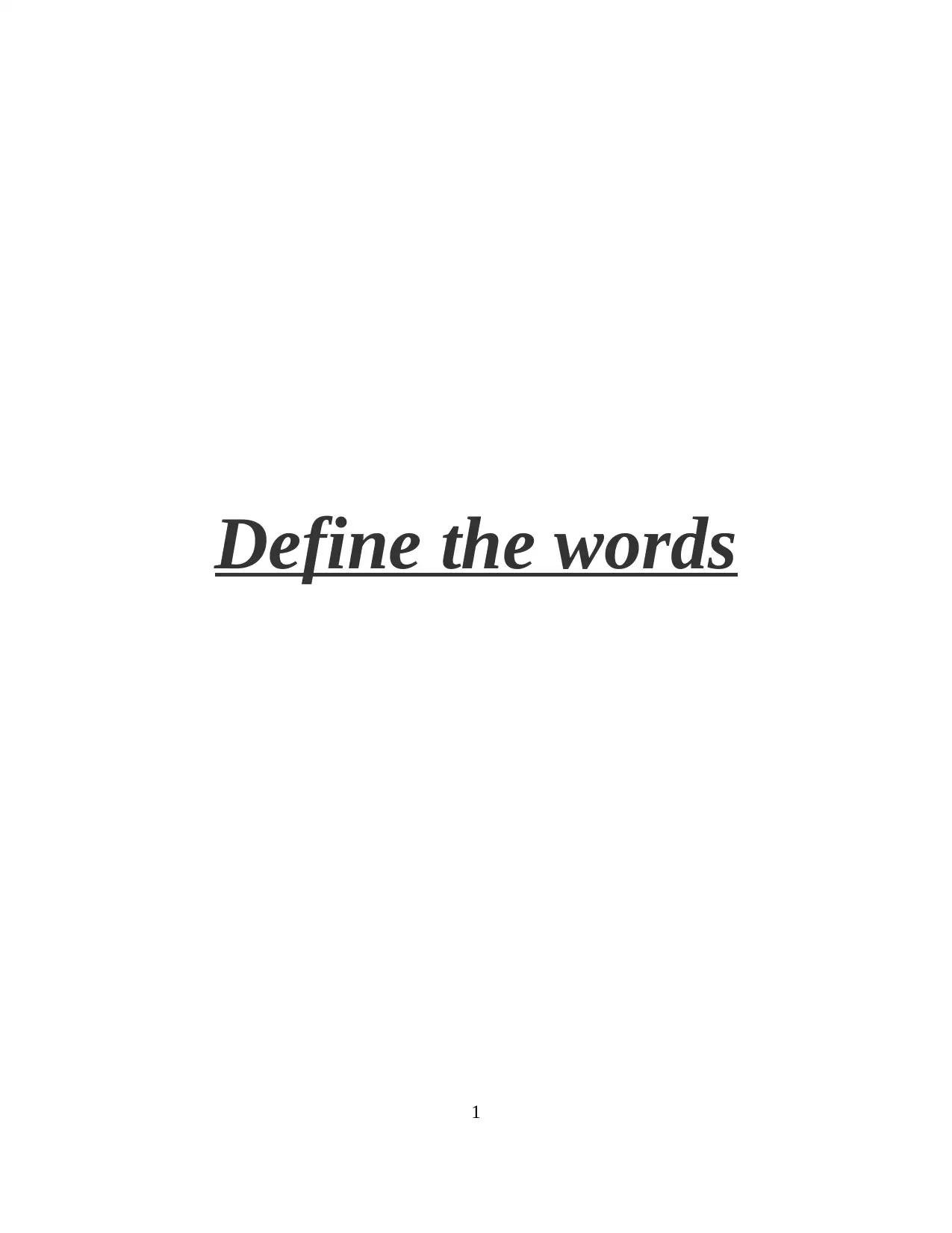
Define the words
1
1
Paraphrase This Document
Need a fresh take? Get an instant paraphrase of this document with our AI Paraphraser

Contents
DEFINITION...................................................................................................................................3
REFERENCES................................................................................................................................6
2
DEFINITION...................................................................................................................................3
REFERENCES................................................................................................................................6
2
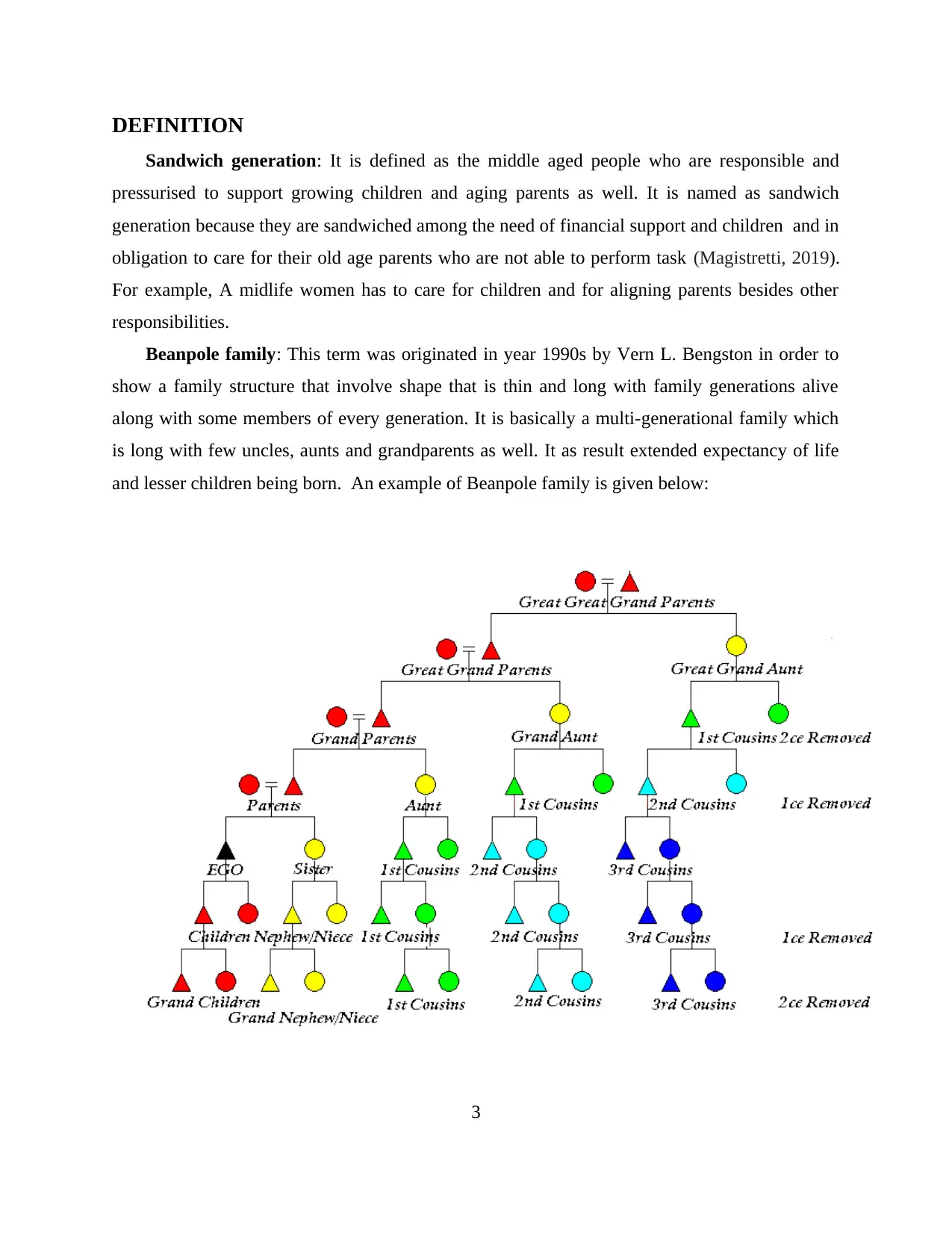
DEFINITION
Sandwich generation: It is defined as the middle aged people who are responsible and
pressurised to support growing children and aging parents as well. It is named as sandwich
generation because they are sandwiched among the need of financial support and children and in
obligation to care for their old age parents who are not able to perform task (Magistretti, 2019).
For example, A midlife women has to care for children and for aligning parents besides other
responsibilities.
Beanpole family: This term was originated in year 1990s by Vern L. Bengston in order to
show a family structure that involve shape that is thin and long with family generations alive
along with some members of every generation. It is basically a multi-generational family which
is long with few uncles, aunts and grandparents as well. It as result extended expectancy of life
and lesser children being born. An example of Beanpole family is given below:
3
Sandwich generation: It is defined as the middle aged people who are responsible and
pressurised to support growing children and aging parents as well. It is named as sandwich
generation because they are sandwiched among the need of financial support and children and in
obligation to care for their old age parents who are not able to perform task (Magistretti, 2019).
For example, A midlife women has to care for children and for aligning parents besides other
responsibilities.
Beanpole family: This term was originated in year 1990s by Vern L. Bengston in order to
show a family structure that involve shape that is thin and long with family generations alive
along with some members of every generation. It is basically a multi-generational family which
is long with few uncles, aunts and grandparents as well. It as result extended expectancy of life
and lesser children being born. An example of Beanpole family is given below:
3
⊘ This is a preview!⊘
Do you want full access?
Subscribe today to unlock all pages.

Trusted by 1+ million students worldwide
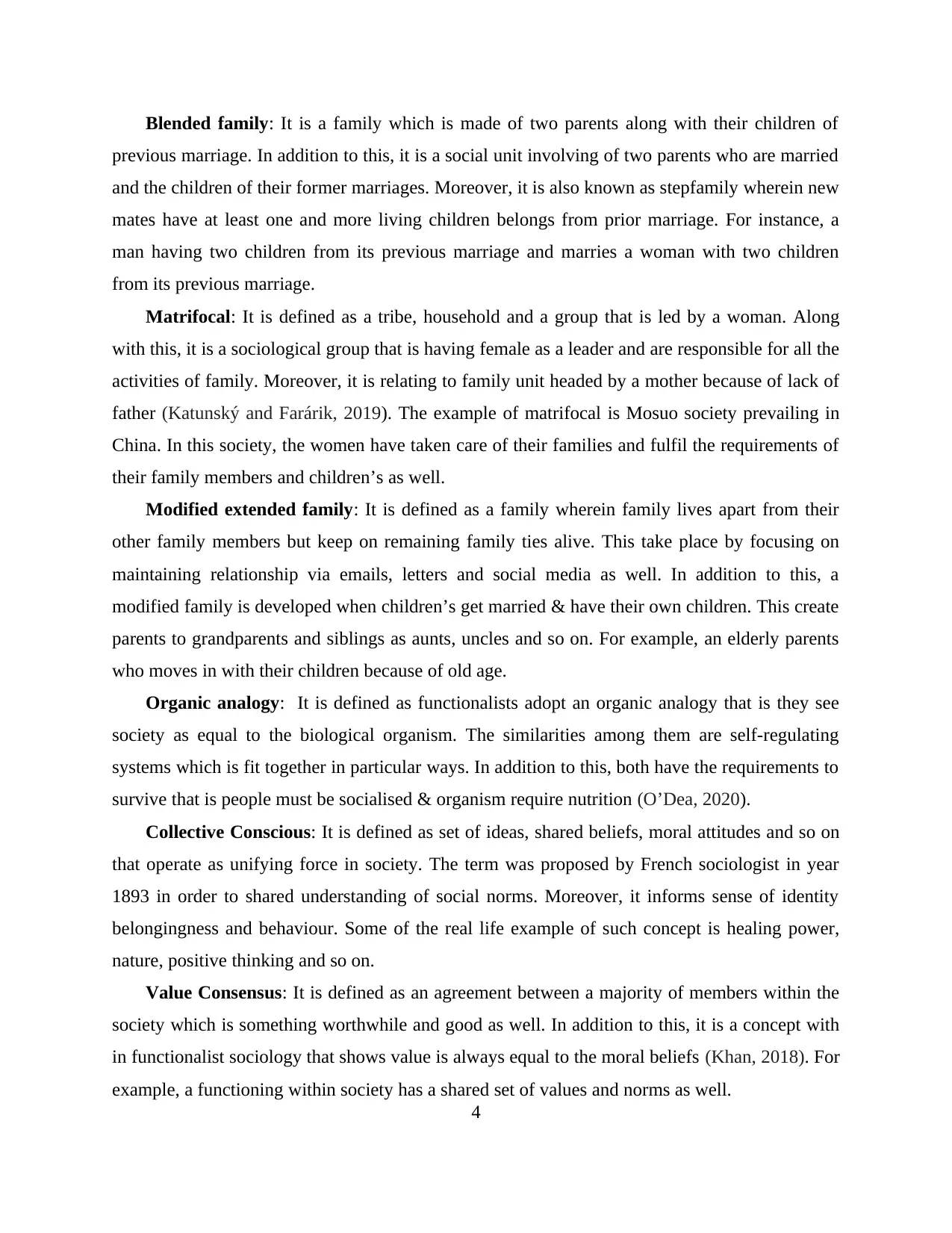
Blended family: It is a family which is made of two parents along with their children of
previous marriage. In addition to this, it is a social unit involving of two parents who are married
and the children of their former marriages. Moreover, it is also known as stepfamily wherein new
mates have at least one and more living children belongs from prior marriage. For instance, a
man having two children from its previous marriage and marries a woman with two children
from its previous marriage.
Matrifocal: It is defined as a tribe, household and a group that is led by a woman. Along
with this, it is a sociological group that is having female as a leader and are responsible for all the
activities of family. Moreover, it is relating to family unit headed by a mother because of lack of
father (Katunský and Farárik, 2019). The example of matrifocal is Mosuo society prevailing in
China. In this society, the women have taken care of their families and fulfil the requirements of
their family members and children’s as well.
Modified extended family: It is defined as a family wherein family lives apart from their
other family members but keep on remaining family ties alive. This take place by focusing on
maintaining relationship via emails, letters and social media as well. In addition to this, a
modified family is developed when children’s get married & have their own children. This create
parents to grandparents and siblings as aunts, uncles and so on. For example, an elderly parents
who moves in with their children because of old age.
Organic analogy: It is defined as functionalists adopt an organic analogy that is they see
society as equal to the biological organism. The similarities among them are self-regulating
systems which is fit together in particular ways. In addition to this, both have the requirements to
survive that is people must be socialised & organism require nutrition (O’Dea, 2020).
Collective Conscious: It is defined as set of ideas, shared beliefs, moral attitudes and so on
that operate as unifying force in society. The term was proposed by French sociologist in year
1893 in order to shared understanding of social norms. Moreover, it informs sense of identity
belongingness and behaviour. Some of the real life example of such concept is healing power,
nature, positive thinking and so on.
Value Consensus: It is defined as an agreement between a majority of members within the
society which is something worthwhile and good as well. In addition to this, it is a concept with
in functionalist sociology that shows value is always equal to the moral beliefs (Khan, 2018). For
example, a functioning within society has a shared set of values and norms as well.
4
previous marriage. In addition to this, it is a social unit involving of two parents who are married
and the children of their former marriages. Moreover, it is also known as stepfamily wherein new
mates have at least one and more living children belongs from prior marriage. For instance, a
man having two children from its previous marriage and marries a woman with two children
from its previous marriage.
Matrifocal: It is defined as a tribe, household and a group that is led by a woman. Along
with this, it is a sociological group that is having female as a leader and are responsible for all the
activities of family. Moreover, it is relating to family unit headed by a mother because of lack of
father (Katunský and Farárik, 2019). The example of matrifocal is Mosuo society prevailing in
China. In this society, the women have taken care of their families and fulfil the requirements of
their family members and children’s as well.
Modified extended family: It is defined as a family wherein family lives apart from their
other family members but keep on remaining family ties alive. This take place by focusing on
maintaining relationship via emails, letters and social media as well. In addition to this, a
modified family is developed when children’s get married & have their own children. This create
parents to grandparents and siblings as aunts, uncles and so on. For example, an elderly parents
who moves in with their children because of old age.
Organic analogy: It is defined as functionalists adopt an organic analogy that is they see
society as equal to the biological organism. The similarities among them are self-regulating
systems which is fit together in particular ways. In addition to this, both have the requirements to
survive that is people must be socialised & organism require nutrition (O’Dea, 2020).
Collective Conscious: It is defined as set of ideas, shared beliefs, moral attitudes and so on
that operate as unifying force in society. The term was proposed by French sociologist in year
1893 in order to shared understanding of social norms. Moreover, it informs sense of identity
belongingness and behaviour. Some of the real life example of such concept is healing power,
nature, positive thinking and so on.
Value Consensus: It is defined as an agreement between a majority of members within the
society which is something worthwhile and good as well. In addition to this, it is a concept with
in functionalist sociology that shows value is always equal to the moral beliefs (Khan, 2018). For
example, a functioning within society has a shared set of values and norms as well.
4
Paraphrase This Document
Need a fresh take? Get an instant paraphrase of this document with our AI Paraphraser
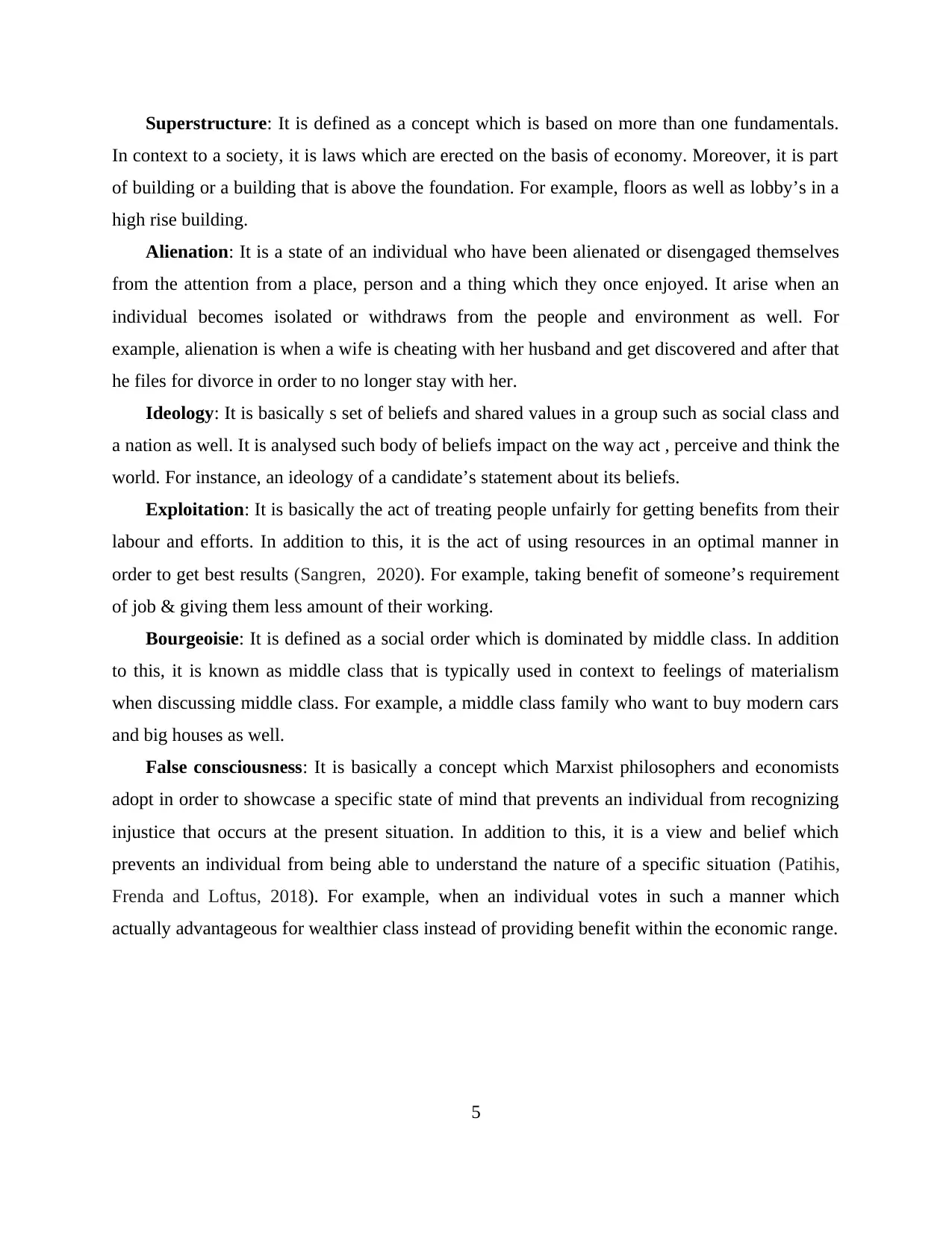
Superstructure: It is defined as a concept which is based on more than one fundamentals.
In context to a society, it is laws which are erected on the basis of economy. Moreover, it is part
of building or a building that is above the foundation. For example, floors as well as lobby’s in a
high rise building.
Alienation: It is a state of an individual who have been alienated or disengaged themselves
from the attention from a place, person and a thing which they once enjoyed. It arise when an
individual becomes isolated or withdraws from the people and environment as well. For
example, alienation is when a wife is cheating with her husband and get discovered and after that
he files for divorce in order to no longer stay with her.
Ideology: It is basically s set of beliefs and shared values in a group such as social class and
a nation as well. It is analysed such body of beliefs impact on the way act , perceive and think the
world. For instance, an ideology of a candidate’s statement about its beliefs.
Exploitation: It is basically the act of treating people unfairly for getting benefits from their
labour and efforts. In addition to this, it is the act of using resources in an optimal manner in
order to get best results (Sangren, 2020). For example, taking benefit of someone’s requirement
of job & giving them less amount of their working.
Bourgeoisie: It is defined as a social order which is dominated by middle class. In addition
to this, it is known as middle class that is typically used in context to feelings of materialism
when discussing middle class. For example, a middle class family who want to buy modern cars
and big houses as well.
False consciousness: It is basically a concept which Marxist philosophers and economists
adopt in order to showcase a specific state of mind that prevents an individual from recognizing
injustice that occurs at the present situation. In addition to this, it is a view and belief which
prevents an individual from being able to understand the nature of a specific situation (Patihis,
Frenda and Loftus, 2018). For example, when an individual votes in such a manner which
actually advantageous for wealthier class instead of providing benefit within the economic range.
5
In context to a society, it is laws which are erected on the basis of economy. Moreover, it is part
of building or a building that is above the foundation. For example, floors as well as lobby’s in a
high rise building.
Alienation: It is a state of an individual who have been alienated or disengaged themselves
from the attention from a place, person and a thing which they once enjoyed. It arise when an
individual becomes isolated or withdraws from the people and environment as well. For
example, alienation is when a wife is cheating with her husband and get discovered and after that
he files for divorce in order to no longer stay with her.
Ideology: It is basically s set of beliefs and shared values in a group such as social class and
a nation as well. It is analysed such body of beliefs impact on the way act , perceive and think the
world. For instance, an ideology of a candidate’s statement about its beliefs.
Exploitation: It is basically the act of treating people unfairly for getting benefits from their
labour and efforts. In addition to this, it is the act of using resources in an optimal manner in
order to get best results (Sangren, 2020). For example, taking benefit of someone’s requirement
of job & giving them less amount of their working.
Bourgeoisie: It is defined as a social order which is dominated by middle class. In addition
to this, it is known as middle class that is typically used in context to feelings of materialism
when discussing middle class. For example, a middle class family who want to buy modern cars
and big houses as well.
False consciousness: It is basically a concept which Marxist philosophers and economists
adopt in order to showcase a specific state of mind that prevents an individual from recognizing
injustice that occurs at the present situation. In addition to this, it is a view and belief which
prevents an individual from being able to understand the nature of a specific situation (Patihis,
Frenda and Loftus, 2018). For example, when an individual votes in such a manner which
actually advantageous for wealthier class instead of providing benefit within the economic range.
5
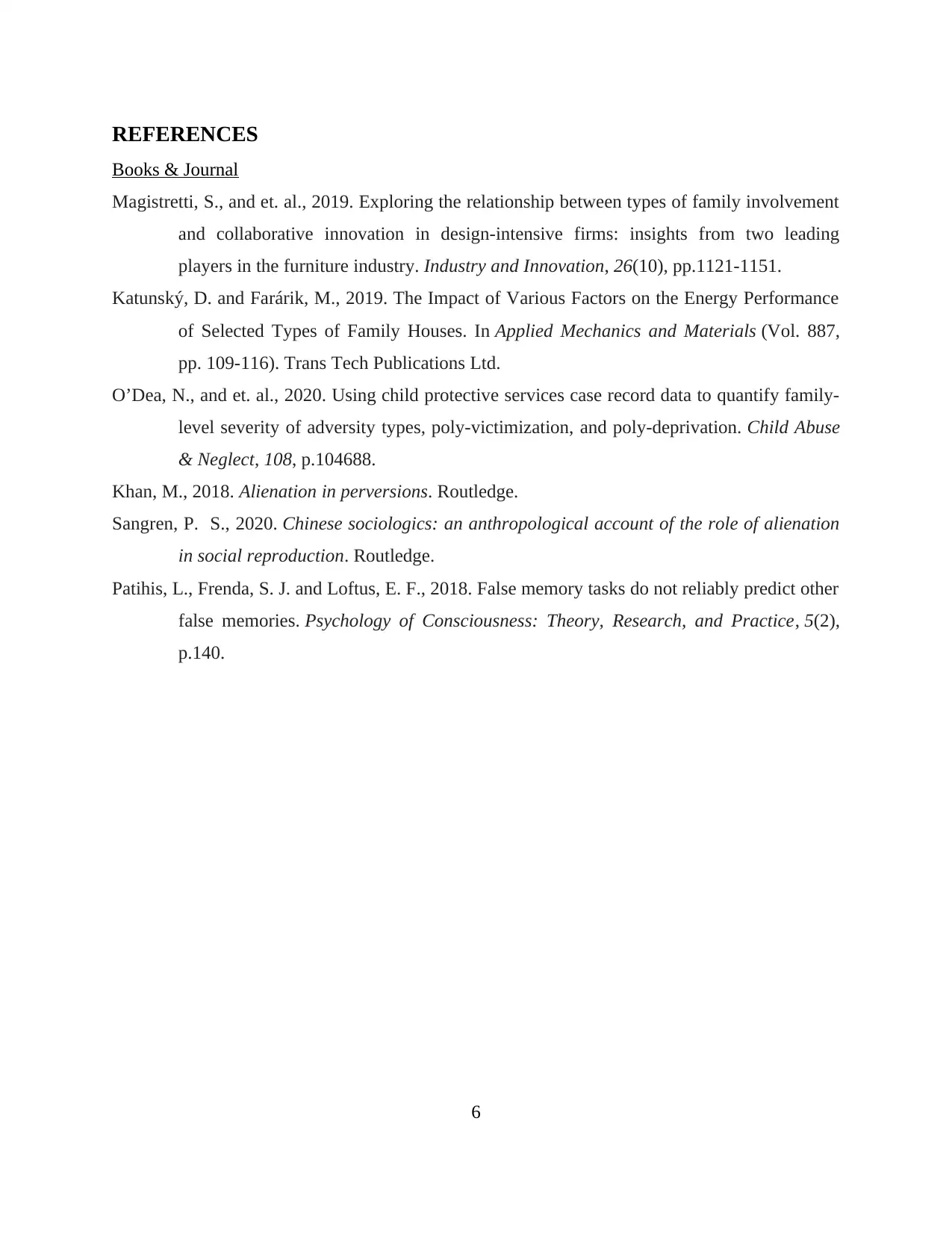
REFERENCES
Books & Journal
Magistretti, S., and et. al., 2019. Exploring the relationship between types of family involvement
and collaborative innovation in design-intensive firms: insights from two leading
players in the furniture industry. Industry and Innovation, 26(10), pp.1121-1151.
Katunský, D. and Farárik, M., 2019. The Impact of Various Factors on the Energy Performance
of Selected Types of Family Houses. In Applied Mechanics and Materials (Vol. 887,
pp. 109-116). Trans Tech Publications Ltd.
O’Dea, N., and et. al., 2020. Using child protective services case record data to quantify family-
level severity of adversity types, poly-victimization, and poly-deprivation. Child Abuse
& Neglect, 108, p.104688.
Khan, M., 2018. Alienation in perversions. Routledge.
Sangren, P. S., 2020. Chinese sociologics: an anthropological account of the role of alienation
in social reproduction. Routledge.
Patihis, L., Frenda, S. J. and Loftus, E. F., 2018. False memory tasks do not reliably predict other
false memories. Psychology of Consciousness: Theory, Research, and Practice, 5(2),
p.140.
6
Books & Journal
Magistretti, S., and et. al., 2019. Exploring the relationship between types of family involvement
and collaborative innovation in design-intensive firms: insights from two leading
players in the furniture industry. Industry and Innovation, 26(10), pp.1121-1151.
Katunský, D. and Farárik, M., 2019. The Impact of Various Factors on the Energy Performance
of Selected Types of Family Houses. In Applied Mechanics and Materials (Vol. 887,
pp. 109-116). Trans Tech Publications Ltd.
O’Dea, N., and et. al., 2020. Using child protective services case record data to quantify family-
level severity of adversity types, poly-victimization, and poly-deprivation. Child Abuse
& Neglect, 108, p.104688.
Khan, M., 2018. Alienation in perversions. Routledge.
Sangren, P. S., 2020. Chinese sociologics: an anthropological account of the role of alienation
in social reproduction. Routledge.
Patihis, L., Frenda, S. J. and Loftus, E. F., 2018. False memory tasks do not reliably predict other
false memories. Psychology of Consciousness: Theory, Research, and Practice, 5(2),
p.140.
6
⊘ This is a preview!⊘
Do you want full access?
Subscribe today to unlock all pages.

Trusted by 1+ million students worldwide
1 out of 6
Your All-in-One AI-Powered Toolkit for Academic Success.
+13062052269
info@desklib.com
Available 24*7 on WhatsApp / Email
![[object Object]](/_next/static/media/star-bottom.7253800d.svg)
Unlock your academic potential
Copyright © 2020–2026 A2Z Services. All Rights Reserved. Developed and managed by ZUCOL.


